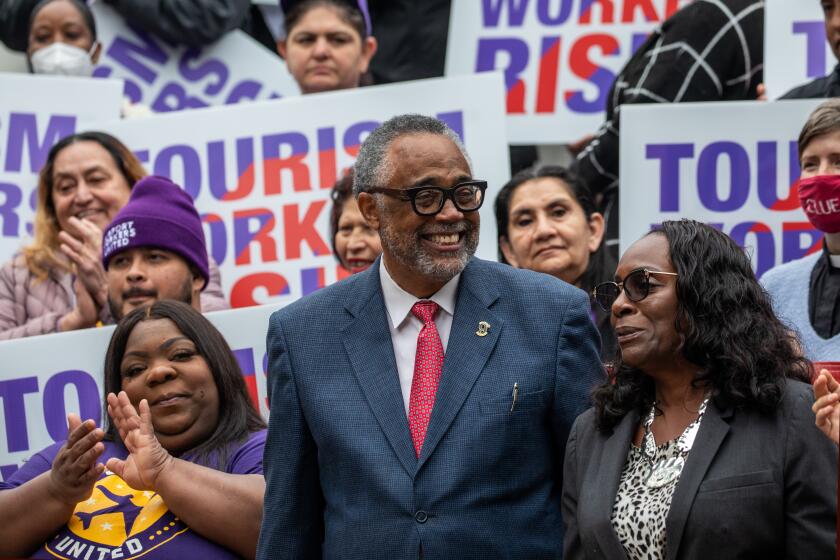L.A. County supervisors propose $25 minimum wage for hotel, theme park workers

The Los Angeles County Board of Supervisors will soon consider a proposal requiring hotel and theme park workers in unincorporated areas to be paid at least $25 an hour, rising to $30 an hour by 2028, when the Summer Olympics will be held in Los Angeles.
Chair Janice Hahn, who proposed the motion at Tuesday’s board meeting, said too many employers are paying their workers low wages, which exacerbates poverty, homelessness and housing insecurity.
At the same time, hoteliers benefit from county investments in beaches and parks, attracting tourists to the region, and theme parks benefit from special zoning privileges, giving the county a vested interest in how their workers are paid, Hahn said.
The measure would apply to employees of Universal Studios Hollywood and Six Flags Magic Mountain, and people working at hotels with more than 60 rooms.
If passed, the county ordinance would also require all service charges to be paid to workers.
Hotel groups said they oppose the measure that would boost the minimum wage for some Los Angeles hotel and airport workers to $30 an hour by 2028.
“A $25 minimum wage, up from the current minimum wage of $16.90, would not make these workers rich, but it would make their lives a little easier and may mean that they don’t need to work multiple jobs just to stay in their homes,” Hahn said.
The supervisors will consider the motion at their Sept. 12 meeting.
If Hahn’s motion passes, county staff will draft the Tourism Worker Retention Minimum Wage Ordinance in 45 days. The supervisors would then vote on the ordinance. It was unclear how soon the ordinance would go into effect if passed.
Hahn said the motion, co-authored by Supervisor Lindsey P. Horvath, is similar to proposals being considered in Los Angeles and Long Beach — a point that industry leaders quickly fired back on.
Heather Rozman, president and chief executive of the Hotel Assn. of Los Angeles, said Hahn’s “copy and paste” lawmaking was bad public policy.
The board should complete an economic impact analysis, like cities with similar proposals, before moving forward, Rozman said.
“Maybe the supervisors can pay their county staff a minimum wage of $25 an hour first,” Rozman said in a statement. “It’s disappointing that one special interest is proposing ordinances through the Los Angeles region that would have a devastating impact on small business and local government tax revenue. Instead of focusing on a small percentage of workers, leaders in this region should develop a holistic solution to our affordability crisis that will benefit all.”
Sabrina Demayo Lockhart, executive director of the California Attractions and Parks Assn., said her group had only just seen the proposal.
“We welcome the supervisor’s invitation to engage all stakeholders,” Lockhart said in a statement.
At least some of the “huge increase in wages” could be passed on to consumers, although especially at theme parks, consumers are already angry about recent price jumps, said Martin Lewison, a theme park expert and associate professor of business management at Farmingdale State College in New York.
That’s why more theme park companies are looking to middle America to build theme parks for consumers who don’t have money to drive or fly to the coasts for a Disney or Universal attraction, he said.
Many low-wage workers in West Hollywood will see a pay increase on Saturday as the city’s minimum jumps to $19.08 an hour.
“Both of those industries have been resistant to wage increases for a long time,” Lewison said. “In some ways, this is justice for workers who you could argue have been underpaid, historically, and so I certainly see how it might be popular politically to make such a proposal.”
Universal employee Danny Bernardo told the supervisors Tuesday it is a common misconception that theme park workers typically are young people looking for seasonal work, when many have worked at parks for decades. Yet many are paid barely more than minimum wage, despite their years of service, Bernardo said.
Many have second and third jobs, often full-time employment elsewhere, and are on public benefits, face evictions and even skip meals, he said.
“These aren’t just stories — these are the experiences of myself, my brothers and sisters and kin,” said Bernardo, an Amusement Area Employees Union B-192 member. “To meet the cost of living, many of our workers are only working and not living.”
Times staff writer Hugo Martín contributed to this report.
More to Read
Sign up for Essential California
The most important California stories and recommendations in your inbox every morning.
You may occasionally receive promotional content from the Los Angeles Times.













